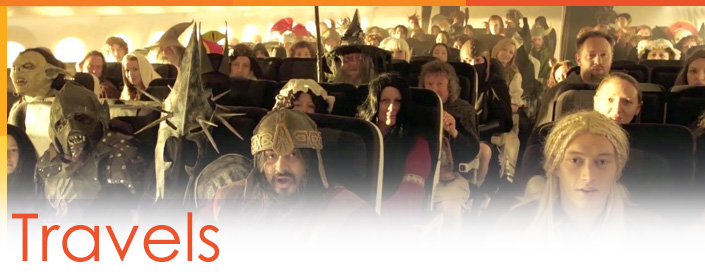
Worlds and what you need to be the Head Judge of a Professional event
CIAO to everybody,
2016 has ended, and we are celebrating the beginning of a new year… that I wish will be full of adventures like 2016.
Today, we are going to speak about my favorite event of the year: the World Magic Cup (or, as I like to call it, the “Olympic Games of Magic”).
Then, I would like to offer you the first article of a series dedicated to the figure of the “Head Judge”; today, we are going to have an overview of his qualities and his contributions to an event.
Enjoy!
World Magic Cup 2016
World Championship, Olympic Games, World Cup… these are all expressions that represent a meeting of sportsmen from many countries, “battling” to determine the best athletes.
This kind of competition has existed since even before Christ, many many many years ago.

In the ancient times, it is said that the Olympic Games were even able to interrupt wars between cities!
In the modern times, with the very few exceptions of USA and CCCP not sending their athletes to the Games that took place in the “enemy” country (personal comment: shame!), the Olympic athletes have been making their best to send messages of peace to the entire world.
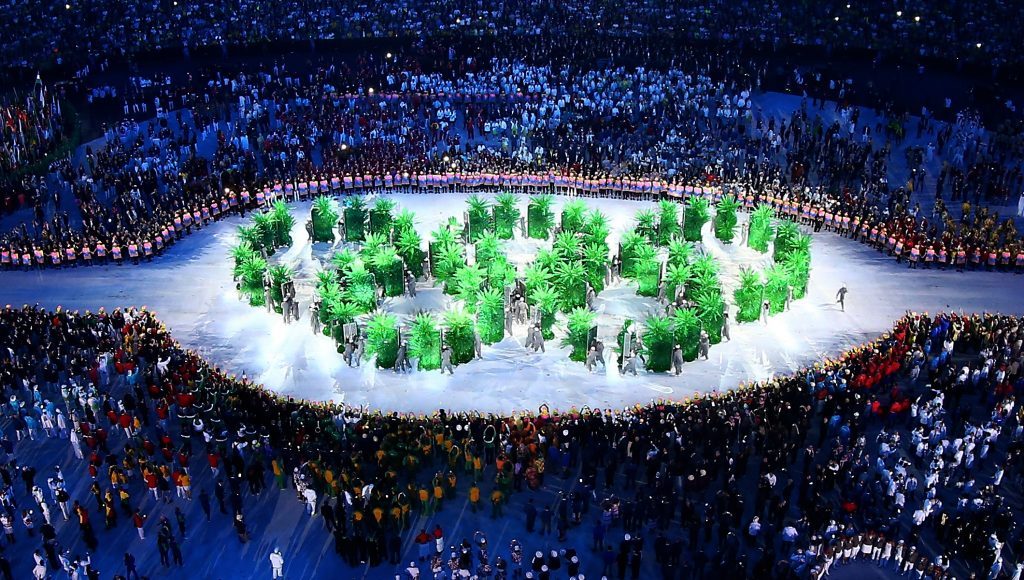
In our world of Magic, the Olympic Games are called “World Magic Cup”, a beautiful event that welcomes more than 70 countries in a team competition surrounded by flags, fascinating clothing and a special atmosphere that I don’t see in other events.

The 2016 edition took place in Rotterdam, in the Netherlands, and for me was edition number fourteen (in a row, a tradition that I’m looking forward to continuing for a very long time!).
A Long Series of World Championships!
I took the time to check my archives, and I put together the list of World Championship cities and head judges:
2016, Rotterdam: Scott Marshall
2015, Barcelona: Scott Marshall (Top 8: Riccardo Tessitori)
2014, Nice: Kevin Desprez
2013, Amsterdam: Jason Lemahieu
2012, Indianapolis: Riccardo Tessitori
2011, San Francisco: Sheldon Menery
2010, Chiba: Riccardo Tessitori
2009, Rome: Sheldon Menery
2008, Memphis: Toby Elliott
2007, New York: Mike Guptil (Standard: Riccardo Tessitori; Legacy: Scott Marshall; Draft: David Vogin; 2HG draft: Mike Guptil; Top8: Riccardo Tessitori)
2006, Paris: Jaap Brower
2005, Yokohama: Sheldon Menery
2004, San Francisco: Hoogendijk Gijsbert
2003, Berlin: Rune Horvik
What a list of names! I had the chance of meeting and working with all of them, and each of them made a significant contribution to the judge and person I am today.
Then, thanks to the JudgeWiki, which is maintained by a few Magic judges, I could find the names of head judges of the very distant past:
2002, Sydney: Collin Jackson
2001, Toronto: Mike Donais
2000, Brussels: Cyril Grillon
1999, Yokohama: unknown, sorry
1998, Seattle: Charlie Catino
1997, Seattle: Charlie Catino
1996, Seattle: unknown, sorry
1995, Seattle: Jason Carl and Kyle Namvar
1994, Milwaukee: Steve Bishop
The Qualities of the Head Judge
Sometimes, I get asked about what is needed to become a head judge of a Grand Prix or Pro Tour.
Today, I would like to offer you an answer with a style that might be different from a usual answer.
We are going to see three steps (have I been watching too many trilogies recently? ^__^).
First, the very basic skills to be an excellent international judge and a starting GP head judge (probably not sufficient, but in my opinion necessary).
Then, the advanced skills, which complete the identikit of a good head judge.
Finally, the master skills, which are rare to be found and make the difference between a good head judge and a real example to follow (this part will just be my opinion, as different people with different environments and different experiences may have a different idea of “master”).
What are the qualities in these three steps?
BASIC – core skills: rules, policy, logistics, communication
ADVANCED – flexibility and capacity to analyze situations (needs/constraints/pros/cons)
MASTER – the ability to have an impact
Why these three steps?
1 (basic) – The service we want to offer must have a solid, technical basis
2 (advanced) – Correctly analyzing the needs, assessing the constraints and applying the priorities is the way to determine the “best” solution for the specific situations, with the most appropriate balance
3 (master) – The game will prosper if we nurture it; the key element of this game is PEOPLE
Step 1: BASIC
First and obvious, the head judge should have the necessary skills: rules, policy, logistics, communication (both before and during the event) must be at the top level and updated; we may take this for granted, but it’s the basis (“the head judge should be able to head judge the event”, obviously, but it’s good to define what “head judging an event without issues” means).
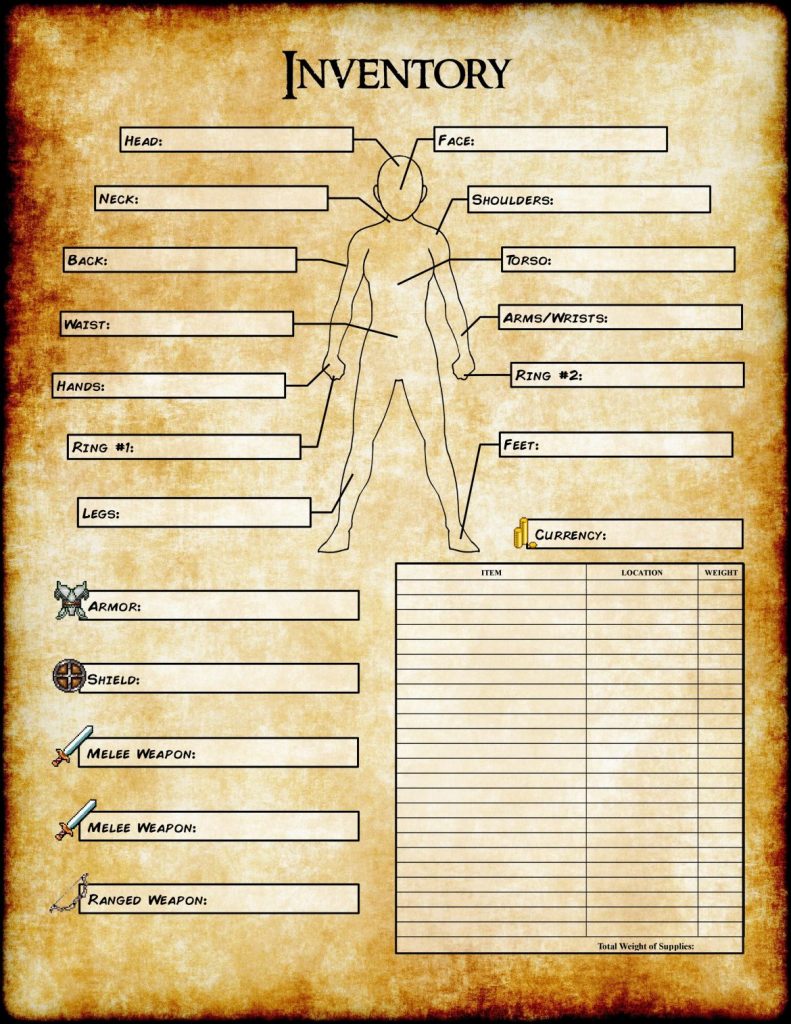
The service we offer must have solid, technical basis; there are always logistical aspects to make the event run smoothly and with few delays; there are always rules questions; there are always infractions and disputes to solve; there are always staff members to communicate with.

Step 2: ADVANCED
The head judge must be flexible and able to make the “best” decisions.
Sometimes, there is no “correct” solution, but there are often “better” solutions.

A very good head judge must be able to understand the different points of view of people involved (organizers, players, judges, Wizards, press, spectators…), so to have the best approach and offer the best service to each of them individually AND make the best global choices, by carefully pondering advantages and disadvantages of each possible solution, depending on the specific priorities.
When a situation is very clear and “by the book”, the “best” solution is already defined (and anyone would be able to take it, because it would just mean applying what’s written in an operation manual), BUT… in many situations, especially when people with different roles or needs are involved, each situation is different and a very good head judge has to possess a way to determine the “best” solution.
All this may sound too abstract, so I will explain myself with a few examples (I will expand one that I handled, and just mention others):
– GP Chiba 2015; in the middle of Sunday, the TO came and said that we all had to be out from the tournament venue before a certain time, otherwise he would pay thousands of dollars for the room for an extra entire day AND that the camera/video crew would need at least 90 minutes to dismantle everything (OUCH!), so even five minutes here and there might have been important. We had a *need* (finishing as early as possible) and some constraints (players’ habits and expected times after the end of swiss, coverage staff needs for interviews and photos…) and, depending on our *priorities* (not exceeding the time limit was the first priority; keeping players comfortable was another; performing all coverage activities was another…) we chose our “best” solution. I got in contact with the coverage (for Top8), the TO and the judges involved in Top8, and we crafted a plan to avoid wasting time, BUT without putting too much pressure on the players (important keyword: *balance*); some of the key points were (1) calling to the stage individual players who had enough points to make top8, (2) get the draft table ready and judges sending players to the table immediately after each got announced, (3) have interviews and photos after the draft / between matches, (4) bring drinks and food to the players and (5) assist anyone involved in all their needs and movements, like a TV show 🙂
– GP Nagoya 2015; there were problems with the pairings for the last round; resources were allocated to handle each individual pod on one side, prepare pairings and a way to calculate standings/tiebreakers on both the tournament software and Excel on the other, keeping players informed every ten minutes and then deciding for a manual solution once the time passing was becoming too big and “continue trying to fix it in the tournament software” stopped being the “best” solution, leaving space to “pairing people manually at each pod” to be the new “best” solution after more than half an hour delay.

A very similar approach can be applied when handling an appeal, finding the correct balance between a thorough explanation (or investigation) and a quick one or the general balance between professionalism and a welcoming/friendly approach. One of the most famous situations was the one with me and Patrick Chapin, at Pro Tour Dragons of Tarkir.
The same applies to the cases when it’s necessary to assist in handling a conflict (judge-judge, judge-player, players-TO, judges-TO), with the correct balance between fairness and empathy.
Same for when we assist a TO in selecting the staff for his events, with the correct balance between the guarantee of skilled judges and the investment to correctly develop new judges for his events.
Finally, very important, the head judge should be flexible and able to adapt to the different preferences/priorities of Tournament Organizers; organizers in different continents are VERY different and it’s fundamental that the head judge finds the best approach to give the best service that each organizer needs.
Step 3: MASTER
The head judge interacts with many people, potentially with all the people who enter the tournament venue and also many people who aren’t even there!
The organizer and all his staff members, both before and during the event.
Judges, before, during and after the event.
Players; all of them in general announcements (and, for example, pre-event interviews and online messages and follow-up articles!) and individual players during appeals and other interactions.
Then, spectators, press members, Wizards employees, vendors, artists…
Literally, ALL the people in the room and even some people at home.
The head judge is potentially able to have an impact, positive or negative, on all the people in the room, and this is a VERY important aspect to keep in mind.

To better explain, here you have a few examples of situations where I was proud of the extra value I gave to an event:
– GP Sao Paulo 2016: one of the judges / staff members asked me to participate in an interview, a couple of months before the GP, where I tried to add a personal touch, to convey the *emotions* of living in the world of Magic (in an environment of very skilled technicians, I see myself as a person able to bring “a heart” or “a human touch”, which I find of extreme value); then, to complete the interview, I shot a short video (with the Colosseum in the background, the symbol of my city) to invite players to come and experience a Magic Grand Prix. The interview was translated into Portuguese and posted on a national website, and here you have the English version.
– at several Asian GPs, it is common (at least to me) to have gift & food exchanges with vendors and to also establish a relationship with the artists (they sometimes come to the judge dinner, and I was very happy to take care of making them feel included); we are ALL part of a single team, a team that makes the weekend great for everybody.
– GP Chiba 2015: there were two weddings, and I was asked to be the officer (with the wows in Japanese!); I guess it was a request from the man getting married, and at Japanese GPs this year, I still keep getting hugged by one of the braids (either her or her husband work for a vendor/organizer). Though it looks like this has nothing to do with Magic and judging, I believe that a Grand Prix is actually an event, an experience, which is the sum of everything that happens inside the tournament room.
– GP Kuala Lumpur 2014: in a Sealed Deck GP, there are often moments when players have to wait (think about product distribution or deck swap), and an extra “service” is to help them not getting bored; in that room, there was background music, and I took the opportunity to joke with the audience about the music; it was just 30 seconds, but it was a very good mix of short laughs and smiling faces that made the weekend start with a very good mood for everybody (I guess it might have been one of the GPs where players came to me at the end of the day to mention that they had a very enjoyable day or weekend, more than usual); again, it’s another example of “human touch”.
Here you have some details about how a head judge can have an impact:
A master head judge is able to get the best from each member of staff: each judge is a person, with a specific character and specific skills; a very important quality is to correctly motivate each judge and to put him in the best roles according to his skills; a master head judge should *prepare the others for success*:
– each person performs at his best
– each person has a boost of motivation
– each person will go back home with increased skills and a desire to improve even more and go to more events; *preparing the future*, GOAL NUMBER 1
A master head judge nurtures the game: it’s fundamental that an event has a global positive effect on the game (judge program, players’ community, organizer, brand); people may think that a “successful event” is an “event where nothing wrong happens”, and this is a narrow way to see our job; we aren’t judging to “control damages”; we give a positive contribution to the entire environment/game:
– when judges return home and write an article, it’s a sign of success
– when the head judge writes a public report specifically about the event or shares all interesting rules & policy & communication situations with others on forums, it’s a sign of success
– when several judges change their Facebook cover photo to the GP judge photo (GP Sao Paulo 2016), it’s a sign of success
– when players write articles about their positive experiences and specifically mention the judges, it’s a sign of success
– when players come to the judges to ask to take photos together and/or sign their cards and playmats, it’s a sign of success
(you got my point, we aren’t just “rules experts” or “logistics operators”, we potentially are a significant emotional element of our events!)
– when judges give and receive feedback for their professional growth, it’s a sign of success
– when judges build personal relationships (and organize extra-tournament activities or even build partnerships), it’s a sign of success

What does a master head judge need to remember:
“The game will prosper if we nurture it; the key element of this game is PEOPLE”
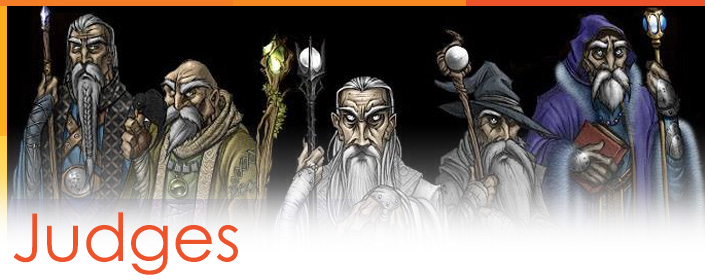
Great Judges of the World: Scott Marshall
Scott Marshall, who has the nickname of “Uncle Scott” (proudly created by me!) in the Magic judge community, is one of the most known, most prepared and proud founders of what the judge program is today.
He has been judging since… well, sorry, I don’t know, he started before I did; when I met him, he was already famous!

He is one of the very few people who achieved “Level five”, which is the “Legendary” level, or the “Divinity” level; it’s a level that I associate with the symbols of the judge program.
Yes, symbols, like Pele for soccer, Michael Jordan for basketball, Bill Gates for computers…
Each of those “symbols” is different; depending on you, there will be a different symbol who may be your main inspiration, and I wish you will be able to meet all the great judges I’m introducing to you 😉
Scott Marshall got another very special recognition for his huge contribution to the judge program: he’s a member of the Judges Hall of Fame!
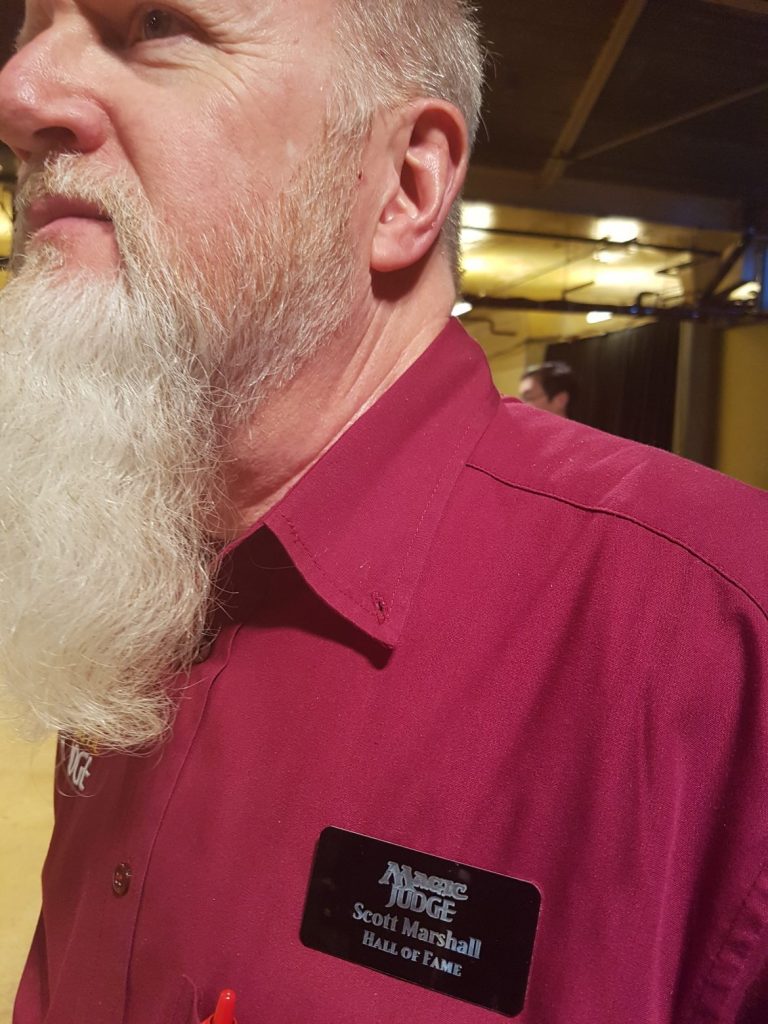
Goodbye World Magic Cup
… and another awesome adventure has come to an end.
Goodbye World Magic Cup, meet you again in a year!
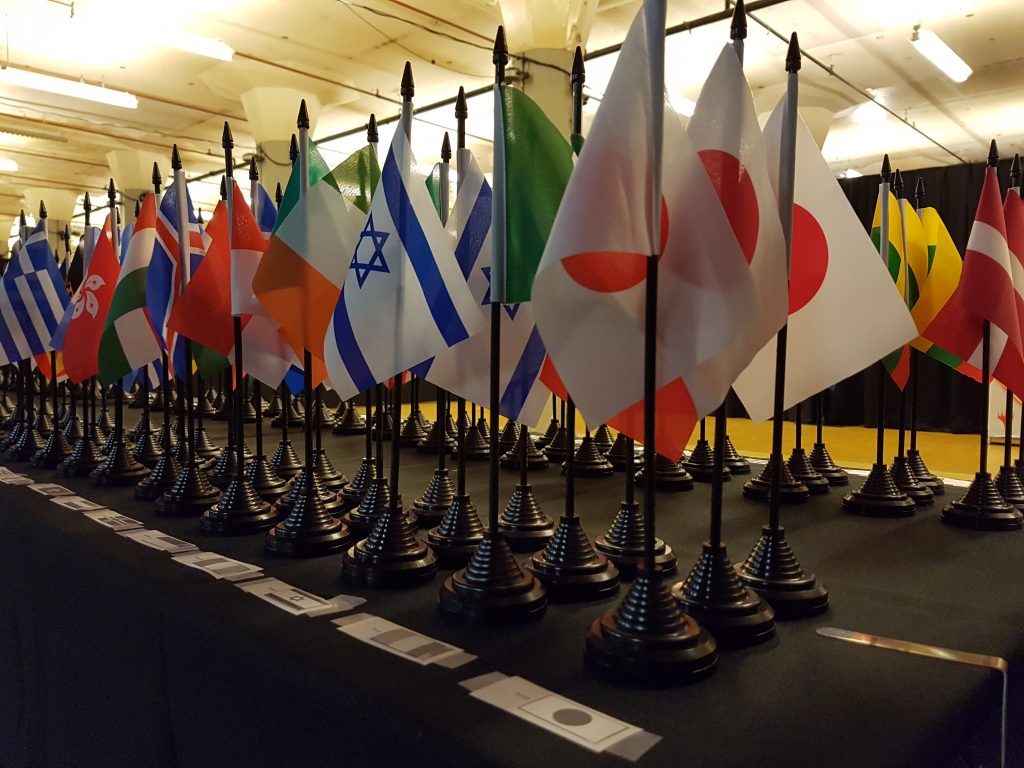
I hope you enjoyed this article, and I’m looking forward to reading your comments.
If you want to add a comment and discuss this article in the Judge forums, click HERE.
All comments, feedback and advice are very welcome 🙂

